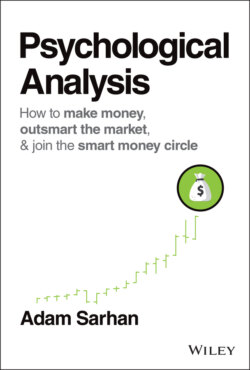Читать книгу Psychological Analysis - Adam Sarhan - Страница 9
Foreword
ОглавлениеI want to thank Leo Melamed, the man who literally created stock market futures, currency futures, and treasury futures after running his “idea” by the legendary economist Milton Friedman. Leo's story is remarkable, and his knowledge, experience, and wisdom is second to none. Leo, thank you for your friendship, guidance, and support during my “journey.” Leo sent me this excerpt from his wonderful book, Man of the Futures, and he shares timeless wisdom about psychology and futures trading. The same underlying principles apply to trading and speculating in just about any liquid and freely traded public market in the world. The lessons outlined in this book are designed to help you thrive in all market environments.
“Do you think I can make money speculating in futures?”
I have been asked this question, in one form or another, countless times. Unfortunately, it is a question without an easy answer. I have seen seemingly well‐qualified people fail in their attempts at futures trading and investments. I have seen the least likely type succeed. Consequently, I have learned never to make a definite evaluation of a person's prospects until after I have had an adequate opportunity to really get to know the person and observe his or her actions and reactions to market situations.
It would be nice if there was a simple test which one could take to determine the issue. Much of it has to do with psychology. In most respects, this is the overriding ingredient that divides winners from losers in futures trading. The type of person you are, i.e., the way you react under pressure? After you enter the market will your judgment be influenced by emotion based on profit or loss? Your philosophical approach toward money? Will other life concerns or circumstances affect your decision making? Will you be foolishly swayed by the actions of others? Conversely, will you stubbornly refuse to listen to good advice? If you find you are wrong, can you openly admit error in the face of defeat? Remember, you will have to admit defeat in broad daylight. Your broker will always know and, eventually, so will your family and friends.
In futures trading, one's personality and emotions are stripped of customary buffers and aids that offer comfort and assistance in most other stresses of life. Moreover, in trading, emotional problems are enormously magnified because you are dealing with money—your money! Here, your personality, your emotions, your character are tested as nowhere else. The normal tranquilizers or accepted diversions which we consciously or unconsciously lean on in other fields of endeavor are not available in this challenging field.
Here, you cannot adjourn the meeting to think things over, you cannot temporarily turn to a different subject, you cannot postpone a decision to consult with an expert or friend. Nor can you take time out to relax. The market goes on with or without you, the moment of decision cannot wait. Your emotions and your psychological make‐up must be such that they will not interfere with a prudent decision at the instant when you must make it. Your personality cannot be such that it requires some form of diversion before you can rely on your judgment at a critical moment.
These psychological elements are but a sampling of the important essentials in determining your probable chances of success or failure in futures trading—quite apart from luck and being right on the fundamentals. In futures trading, more so than in most other fields of endeavor, one's psychological make‐up is critical.
Best wishes,
Leo Melamed
Chairman Emeritus, CME Group, Inc.
